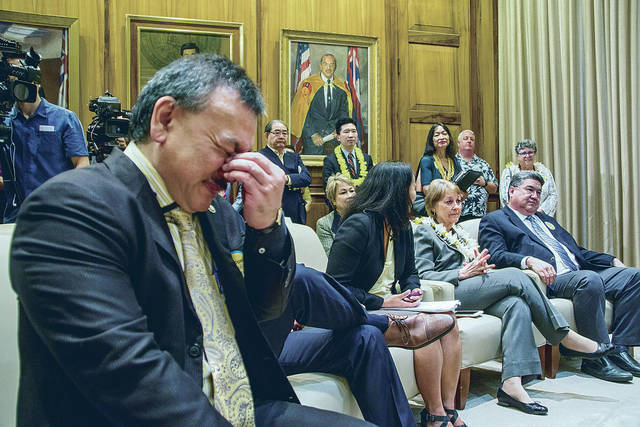Medical aid in dying becomes law

DENNIS ODA / DODA@STARADVERTISER.COM
State Rep. John Mizuno got emotional Thursday as cancer-stricken lobbyist John Radcliffe talked about the bill to legalize medically assisted death that Gov. David Ige signed the same day.
Beginning Jan. 1, terminally ill patients in the final stages of dying will have the option to control when, where and how they die, following Gov. David Ige’s signing Thursday of a bill to legalize medically assisted death.
The new law Opens in a new tab, dubbed the “Our Care, Our Choice” Act, caps a decades-long effort to allow the controversial practice.
Under the law, mentally competent adult residents, who have been given six months or less to live, will be able to request life- ending prescriptions to be self-administered.
“Our state has been contemplating this law for more than 20 years,” Ige told a standing-room-only crowd of supporters gathered in his offices to witness the bill signing.
The governor was a state senator 16 years ago when a death-with-dignity bill failed to pass Opens in a new tab the Senate.
“It is time for terminally ill, mentally competent Hawaii residents who are suffering to make their own end-of-life choices with dignity, grace and peace,” Ige said. “We know that our loved ones will eventually die, but they don’t need to suffer.”
Don't miss out on what's happening!
Stay in touch with breaking news, as it happens, conveniently in your email inbox. It's FREE!
Ige said the law has strict eligibility criteria and safeguards to deter misuse and fraud.
“Above all, this legislation has been written to ensure that the patient is in full control. This is available as an option along with other forms of end-of-life care, and it might not be for everyone,” he said.
Among those on hand for the bill-signing ceremony was retired lobbyist John Radcliffe, who was diagnosed in 2014 with stage 4 liver and colon cancer and became a self-described “poster child,” lobbying the past two sessions in favor of giving terminally ill patients the option to have a peaceful death if suffering becomes unbearable.
Last year a similar bill easily cleared the full Senate but stalled Opens in a new tab in a House committee and never advanced to a floor vote.
Radcliffe said the law will make dying “less terrifying, far more peaceful for those up against a tortured passing.”
“I’m very happy to have been a catalyst in this since last year, and I can honestly say that this is one of the most satisfying lobbying experiences in my life,” he said.
But Radcliffe said he’s outlived his prognosis by more than a year so far and might not need to use the law anytime soon.
“Ironically, it’s not going to affect me personally right away. I just finished my 60th round of chemotherapy (Wednesday), and that means that it’s still working — 20 months or 600 days beyond the timeline that medical science said was likely for me to live,” he said.
“Only a few get this far, and I’m definitely on the day-to-day program,” Radcliffe said. “This bill takes effect in 272 days, and then, you know, of course, you have to go through several things to get to the end, to ‘prove’ that you’re not kidding around or being forced.”
Under the procedures set out in the law, patients would have to submit two verbal requests a minimum of 20 days apart and one written request, signed by at least two witnesses, to their attending physician for a prescription.
Two health care providers would need to confirm the patient’s diagnosis, prognosis, competence and that the request is voluntary. A patient also would need to receive counseling to verify the patient is not suffering from any condition that might interfere with his or her ability to make an informed decision.
The law calls for criminal penalties for tampering with a patient’s prescription request or coercing a patient to request a prescription.
“The safeguards Hawaii state legislators have enacted into this law will ensure that patients are in control of this process and make their own decisions at every step of the way — as is their right,” Peg Sandeen, executive director of the Death With Dignity National Center, said in a statement. “(This) marks a new beginning in Hawaii’s treatment of the terminally ill.”
Hawaii becomes the seventh jurisdiction to legalize medical aid in dying, joining California, Colorado, Oregon, Vermont, Washington state and the District of Columbia.
In initial public hearings Opens in a new tab on the measure, lawmakers heard Opens in a new tab from supporters and critics who shared often- emotional testimony.
Many supporters asserted that individuals of sound mind should have the option to end their lives peacefully and with dignity rather than suffer from debilitating illnesses.
Opponents argued that life should be respected and equated medical aid in dying to suicide. Some said pain relief is already available through hospice and palliative care. On Wednesday a group of church and community leaders delivered to Ige a petition signed by more than 18,000 people calling for action to reduce suicides in Hawaii and stating their opposition to medically assisted death.



